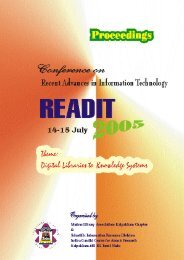READIT-2007 - Indira Gandhi Centre for Atomic Research
READIT-2007 - Indira Gandhi Centre for Atomic Research
READIT-2007 - Indira Gandhi Centre for Atomic Research
Create successful ePaper yourself
Turn your PDF publications into a flip-book with our unique Google optimized e-Paper software.
ROLE OF ELECTRONIC SURVEILLANCE AND<br />
SECURITY SYSTEMS IN ACADEMIC LIBRARIES<br />
L. Rajendran * and G. Rathinasabapathy **<br />
Abstract<br />
Academic libraries are not always safe and secure places and they are facing a wide variety<br />
of security concerns which includes the theft and mutilation of library materials. The results of a<br />
number of library studies reported that a majority of the academic libraries across the globe are<br />
having problems with security. However, it is the duty of any academic library to keep the library<br />
buildings, shelves and stacks open and free without losing items to make available or putting<br />
individuals at unacceptable risk from the malicious, avaricious or senseless acts of others. Arresting or<br />
expelling a member <strong>for</strong> material theft or book/periodical mutilation is common in libraries of<br />
developed countries. But, things are different in Indian conditions. In this context, the technological<br />
advances made it possible to install electronic security systems to overcome the security threats to<br />
some extent. These electronic security systems typically provide alarm notification to the appropriate<br />
authorities, entry control, and site surveillance. The major elements of these systems include burglar<br />
protection, collection security, access control, and video surveillance. This paper attempts to discuss<br />
various electronic surveillance and security systems available to ensure academic library security.<br />
Keywords: Electronic Surveillance, Security Systems, Collection Security, Access Control,<br />
Video Surveillance, Academic Library<br />
1. INTRODUCTION<br />
A library <strong>for</strong>ming part of or attached to a university, college or any<br />
educational institution is known as academic library. Academic libraries differ from a<br />
public library and special library in purpose and of its services. The main function of<br />
an academic library is to function as an auxiliary to parent institution in carrying out<br />
its objectives mainly the education. Library is an important intellectual resource of the<br />
academic community and helps them <strong>for</strong> their self-development to fulfill the<br />
curriculum requirements and to promote studies and research.<br />
2. ACADEMIC LIBRARY<br />
The importance of academic libraries was aptly recorded by the Education<br />
Commission headed by Prof. D.S. Kothari in its report that “the academic library<br />
should provide library facilities and services necessary <strong>for</strong> success of all <strong>for</strong>mal<br />
programmes of instruction, open the door to the world of knowledge that lies beyond<br />
the boundaries of own field of qualification and bring books, students and scholars,<br />
together under conditions which encourage reading pleasure, self discovery, personal<br />
growth and the sharpening of intellectual curiosity”.<br />
There<strong>for</strong>e, the academic library has to build a strong collection in the <strong>for</strong>m of<br />
physical, electronic and digital to cater to the knowledge requirements of students,<br />
faculty members, research scholars and scientists of the academic institution. The<br />
digital collection can easily be preserved on computer systems or other suitable media<br />
* Assistant Librarian, Department of Library Science, Madras Veterinary College, Chennai – 600 007<br />
** Assistant Librarian, Tamilnadu Veterinary and Animal Sciences University, Chennai – 600 007<br />
111

















